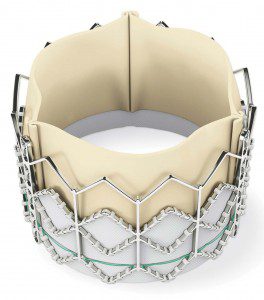By Gino Sedillo, M.D., FACC, CardioVascular Solutions Institute –


The procedure allows for the aortic valve to be replaced with an artificial valve which is placed in the aorta by one of two ways. Trans-femoral approach through a small incision in the groin (femoral artery) or by the Trans-apical approach through a key hole opening in the chest. Typically, a two day hospital stay is requested after the procedure, and patients can expect a quick recovery time.
Who qualifies for this procedure?
Currently, only patients with severe aortic stenosis (narrowing), who are felt to be too high risk for conventional open heart surgery, qualify for this procedure. High risk patients may include the following:
• Patient had previous open heart surgery
• Patient has severe advanced lung disease (COPD)
• Patient is of an advanced age/Frailty
• Patient has weak heart muscle
• Others conditions may apply
How would you benefit from the new TAVR procedure?
People with severe aortic stenosis often experience symptoms of shortness of breath, fatigue, dizziness etc. Many patients report feeling better and experience relief of symptoms shortly after the procedure. Most importantly, they can live longer with a better quality of life.
How does your physician diagnose heart valve disease?
Though many people may experience no symptoms in the early stages, most experience symptoms like chest pain, tiredness, shortness of breath, light-headedness and loss of consciousness. Some of the tools that your doctor may use to diagnose heart valve disease include:
• Physical exam—your physician will take a careful and detailed history from you and will perform a thorough physical exam. During this, your doctor will listen for evidence of heart failure or a heart murmur.
• Electrocardiography (EKG)—an EKG can show the heart’s rhythm, the heart’s rate, and the strength and timing of the electrical currents. This can prove useful for doctors trying to uncover a patient’s underlying symptoms that may be signs of heart disease.
• Chest x-ray—used to diagnose diseases of the heart and lungs as well as to evaluate placement of pacemakers, defibrillators etc.
• Echocardiography—tests used to uncover diseases of the heart and its vessels by using ultrasound to pick up sound waves that are
moving through the heart.
• Cardiac catheterization (angiography)—used to determine if a patient has coronary artery disease. It can also pinpoint any plaque build-up from atherosclerosis.
Ask your cardiologist if you may be a candidate for this novel procedure, or contact our office.
Dr. Gino Sedillo, M.D. F.A.C.C.
Born in Albuquerque, New Mexico, Dr. Sedillo is Board Certified in Internal Medicine, Cardiovascular Diseases and Interventional Cardiology, and has been a member of the American College of Cardiology since 1996. He completed his residency training for Internal Medicine at the University of Texas, where he was voted Intern of the Year and was selected Chief Medical Resident. He completed his Cardiology training at the Texas Heart Institute/ St. Lukes Hospital in Houston, Texas. He was elected Chief Interventional Fellow. Dr. Sedillo received additional specialization in Coronary and Peripheral Vascular Intervention as well as Pacemaker Implantation.
After 15 years of training, Dr. Sedillo started working for the Bradenton Cardiology Center in 1995. While there he performed more than 1,000 procedures per year and he began teaching procedures and techniques to other practicing cardiologists, vascular surgeons, and interventional radiologists. He served as Director of the cardiac catheterization lab at Manatee Memorial Hospital.
Most recently, in May 2011, Dr. Sedillo founded his independent practice, CardioVascular Solutions Institute, with offices in Sarasota and Bradenton. Since then Dr. Sedillo has been named director of the Percutaneous Coronary Intervention program at Doctors Hospital in Sarasota.
When he’s not seeing patients, teaching other physicians or doing clinical research, Sedillo cherishes time with his three children.
Call To Schedule Your Appointment Today!
(941) 747-8789
 Southwest Florida's Health and Wellness Magazine Health and Wellness Articles
Southwest Florida's Health and Wellness Magazine Health and Wellness Articles

